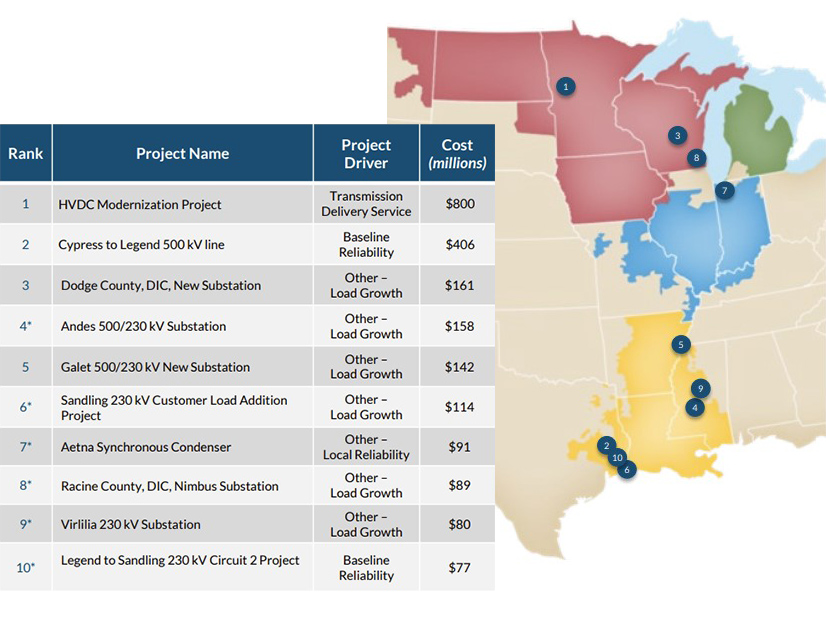MISO’s 2024 transmission planning cycle is shaping up to include 459 new projects totaling $6.7 billion. The RTO shared the plan with stakeholders in a series of subregional planning meetings.
The 2024 Transmission Expansion Plan (MTEP 24) investment contains a little more than $1 billion in baseline reliability projects and $763 million in transmission projects needed for generator interconnection. In keeping with previous MTEP packages, the “other” category takes the largest share of investment, this time at more than $4 billion. “Other” projects include those needed for load growth, transmission owners’ local reliability criteria, and to address the age and poor condition of facilities.
Projects driven by load growth and replacement of subpar facilities will take the largest share of investment this year, at about $1.5 billion apiece.
Senior Expansion Planning Engineer Amanda Schiro said this year, six of the top 10 most expensive projects are in MISO South, with all but one driven by the region’s load growth. This year’s most expensive baseline reliability projects also are in MISO South and involve rebuilding lines and substations, Schiro said during a Sept. 5 Central Subregional Planning meeting.
In a departure from previous years, the 2024 MTEP includes $858 million under what MISO classifies as “transmission delivery service.” The pair of projects submitted by Minnesota Power — one costing $800 million and the other $58 million — would modernize and upgrade Minnesota Power’s existing HVDC system. The HVDC project is MTEP 24’s priciest submittal.
By planning region, MISO West accounts for almost $2.7 billion, MISO South $1.8 billion, MISO Central $1.4 billion and MISO East $771 million.
In MISO South, a single Entergy Texas reliability project is set to account for 40% of the region’s spending. Entergy Texas’ 500-kV Cypress-to-Legend line is estimated at $406 million. MISO said the reliability project performed better when compared to the 500-kV Hartburg-Sabine Junction project, which MISO canceled in 2022 after a legal battle and the need for the project evaporated.
The Southern Renewable Energy Association had requested that MISO explore resurrecting the $134 million Hartburg-Sabine in place of Entergy Texas’ project. (See “Return of Hartburg-Sabine Junction?” MTEP 24 up to $5.8B; Clean Energy Group Asks for Alternative to Pricey Entergy Reliability Project.)
MISO will use another project alternative over a transmission owner’s original project submission. MISO recommended that Michigan Electric Transmission Co. pursue a $45 million relocation of the 138-kV Iosco-Karn line near Michigan’s thumb area rather than a $74 million rebuild. The alternative project involves stringing lines on existing poles.
The MTEP 24 package is larger than MISO anticipated earlier this year and smaller than last year’s record-breaking $9 billion portfolio. (See Early MTEP 24 Designates $5.5B in Transmission Spending and MISO Board Approves $9B MTEP 23; Members Deliberate on New Expedited Review Rules.)
Schiro said officially, MTEP 24 will include not only the traditional MTEP spending, but also it and SPP’s $2 billion Joint Targeted Interconnection Queue portfolio and its second, likely $25 billion long-range transmission plan, bringing total 2024 investment to almost $34 billion.
MISO will dedicate a special teleconference of the Planning Advisory Committee Oct. 1 to reviewing the draft MTEP 24 package of projects.
Rush Island SSR to End Oct. 15
MISO announced that its sole system support resource (SSR) agreement will get a final month-and-a-half extension as the Missouri coal plant associated with it is ordered offline by a federal court.
Ameren Missouri’s Rush Island coal plant is supporting the MISO system from Sept. 1-Oct. 15 under a final SSR agreement. After that, Rush Island will go dormant, ordered offline by the U.S. District Court for the Eastern District of Missouri following years of Clean Air Act violations. (See Ameren Files to Recoup Rush Island Closure Costs from Customers.)
“The boilers are shutting down with or without an SSR agreement,” MISO planner Grant Larson told stakeholders.
MISO said it won’t need the SSR once three MVAR static synchronous compensators are installed on the nearby system. Those upgrades aren’t expected until December, resulting in weeks of potentially precarious operations.
“MISO is prepared to address any operational issues that may arise following the retirement of Rush Island,” MISO spokesperson Brandon Morris said of the gap period beginning in mid-October.
Morris emphasized that MISO planning studies show no concerns once transmission upgrades are in place this December.
The plant has been operating for about two years under SSR agreements, which are used to keep generation operating past planned retirement dates for the sake of system reliability.




